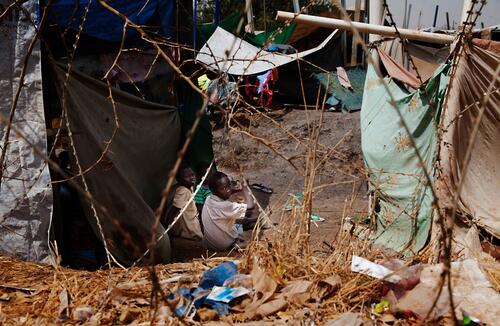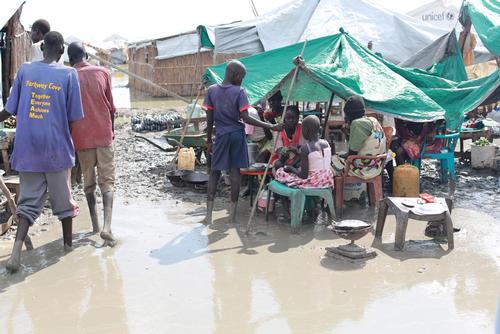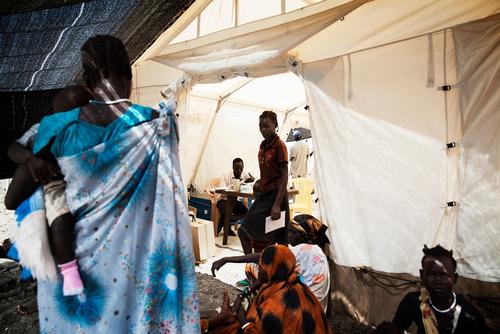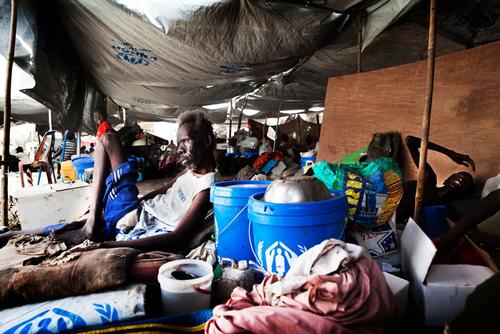This article first appeared in Huffpost.
- MSF Canada’s Executive Director Stephen Cornish recently returned from South Sudan, where he witnessed first-hand the humanitarian crisis currently affecting the world’s youngest country.
- Over the course of his visit — during which he visited several Protection of Civilian camps managed by the UN's mission in South Sudan (UNMISS), where thousands of people have taken refuge from the violence that has swept across the country since last December — he maintained a blog diary, which was originally published by the Huffington Post.
- This is one of his journal entries, chronicling his trips to the POC camps in Malakal, Melut and Bentiu, where Médecins Sans Frontières (MSF) is providing healthcare to those trapped inside with nowhere else to go.
Moving along the bustling market street that divides Malakal’s two Protection of Civilian camps — POC 1 and 2, which are now home to thousands of people displaced from Malakal town — one is first struck by the flimsy putrid row of poorly constructed latrines. With cholera only just subsiding in the area, this blight of poor sanitation cries out for urgent action that incredibly has so far failed to come.
Tents seem to sprout from flooded ditches that meander in serpentine fashion through the haphazard settlements. Even in daylight, wading through the camp is a challenge, with gumboots sinking constantly into a quicksand of sewage and muck. It is no wonder that at night many relieve themselves directly in the ditches rather than venture out. There are also safety concerns expressed by the women, who fear making the journey to the rank dark latrines at night.
We search out a married couple, two former residents of Malakal town whom we are told are now paid to maintain the latrines. They decry the lack of water for hand washing and apologize for the overflowing sewage, which they say is due to the late arrival of the pump truck that hasn’t been seen for days. Robert was a carpenter at the teaching hospital in Malakal, which was recently destroyed by armed groups. He tried to return just once to collect his salary, but says the militias that currently control Malakal town would kill him on sight; he is identifiably scarred, as most Nuer men are, by six lines across his forehead, marks left by a traditional coming-of-age ritual. Elizabeth says she won’t even consider venturing out of the camp until the conflict is brought to an end and the big men put under control.
Obac, our translator, says people in Malakal’s POC camps wish to be given refugee status, since they have been effectively trapped here and now have no place to go. Despite the prevailing fear, the residents we spoke with were grateful for the food aid they receive from the World Food Program and the medical care provided by MSF. They want to move to higher ground, but like the longed-for peace, these are still mere dreams they can only hope will one day come about.
Ahmed, from Nyala, lost his shop in the looting and now runs a small stall in the POC camp, hawking salt, sugar, tea and other items. He restocks his shelves with merchandise sold by traders from Khartoum, who have recently made the long journey here by barge. He cannot afford to return home empty handed, so he stays and tries to rebuild his means.
As I move deeper into the site, a hand motions me into a small hut. An old man — Daniel, who says he may be 65 or 70 or more – sits idling the day away. His children, who he has lost contact with, have fled to Sudan and Ethiopia, and he has been housed here by the camp chairman, who is looking out of him. He complains of aches and pains but cannot venture through the mucky canals to the clinic, so is hoping the rains will subside so he can seek care.
Who, Daniel asks, can say when the war will end? Only the politicians have the power to stop the senseless killing, he says. The ancestors and the NGOs have been disrespected by the armed men who have squandered South Sudan’s independence. Daniel apologizes for the aid workers killed and the hospitals attacked. “Please tell our international friends we are sorry,” he says. To console him, I remind him that few are able to live freedom well on the first try, that we are sometimes bound by chains even after they are loosed. He smiles and agrees, his soul lightened momentarily.
It is common here for people to say they “grew in the war and now become old in it.” The South Sudanese in Malakal’s POC centre seem consigned to the fate of war, and to their new home here in the camp — both things they have simply gotten used to. While the most basic needs of their physical security can be met here, it is up to medical aid workers to ensure they are not now carried off by needless infection and disease. To accept and leave conditions as they are, is to disrespect the dignity of the people we met, like Daniel, who have no place else to go. The donors, aid agencies and UNMISS officials here in Malakal base can and must change conditions for the better now – getting used to things as they are is simply not an option.






